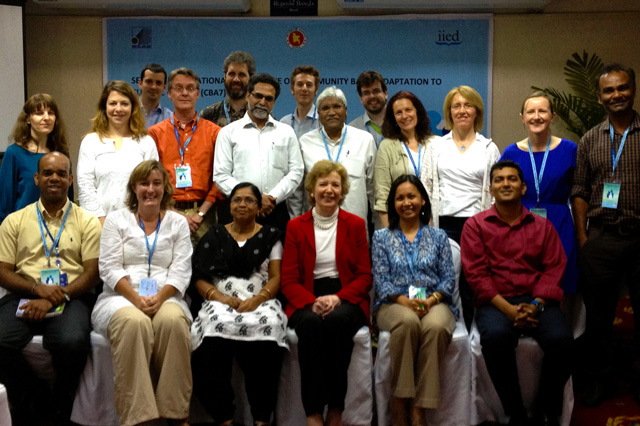At the Seventh International Conference on Community-Based Adaptation to Climate Change (CBA7), in Dhaka, Bangladesh, Mary Robinson discussed the Climate Justice Dialogue, a global initiative to demand more urgency and ambition on climate action.
Front row (l-r): Gerson Brandao, UNOCHA; Laura Lawlor, Trocaire; Luna Panda, Pragati; Mary Robinson, the Foundation; Ronilda Co, World Vision; Tanjir Hossain, Action Aid.
Second row (l-r): Marcela Ondekova, Trocaire; Agnes Otzelberger, CARE; Kevin Henry, CARE; Saroj Dash, Concern; Atiq Rahman, BCAS; Daniela Tarizzo, UNDP; Heather Mc Gray, WRI; Mary Faherty, the Foundation; Mahmudun Nabi Khan, Concern.
Back row (l-r): Laurence Lee, Irish Aid; Pablo Suarez, Red Cross/Red Crescent Climate Centre; Paul Mitchell, Save the Children; Gareth Price Jones, Oxfam.
“A climate justice narrative that amplifies the voices of the most vulnerable can help to change the conversation on climate change and create a demand for action,” Mrs Robinson told delegates, who gathered, from 22-25 April, to learn about the latest approaches for mainstreaming community-based climate change adaption into local, national and international planning and processes.
“By focusing on issues of fairness and justice, including intergenerational justice, a climate justice narrative can serve as a pressure point on the road to an international climate agreement in 2015 as well as the post-2015 development agenda.”
The Mary Robinson Foundation – Climate Justice has partnered with the World Resources Institute on the Climate Justice Dialogue, and in doing so will feature a series of convenings taking place across the globe over the next three years with a view to creating a narrative, collecting ideas and building momentum for a new climate agreement in 2015.
During CBA7, a panel session entitled ‘Human Rights, Equity and the Legal Aspects of Climate Change Adaptation” discussed many of the aspects of the Climate Justice Dialogue. After vibrant discussions, delegates identified their ‘top three’ key equity dimensions of community-based adaptation as:
- access to resources
- gender inequality
- power relations within the community
The feedback sheets from the session also highlighted that there is a lot that can be done to address these inequities, with a convergence of opinion on solutions that focus on empowerment, participation and access to information.
“An equitable international climate change agreement will need to give equal emphasis to adaptation and mitigation,” Mrs Robinson added in her closing remarks to delegates on April 25. “The adaptation community has an important role to play in ensuring this happens. A new climate agreement must recognise that action by countries on adaptation counts just as much as action on mitigation.”
CBA7 was managed by the International Institute for Environment and Development (IIED) and the Bangladesh Centre for Advanced Studies.
Related
Read Mary Robinson’s closing session keynote address at CBA7, 25 April 2013.
Our Work: Equity and Climate Justice
Mary Robinson interview at CBA7 | Video: IIED


